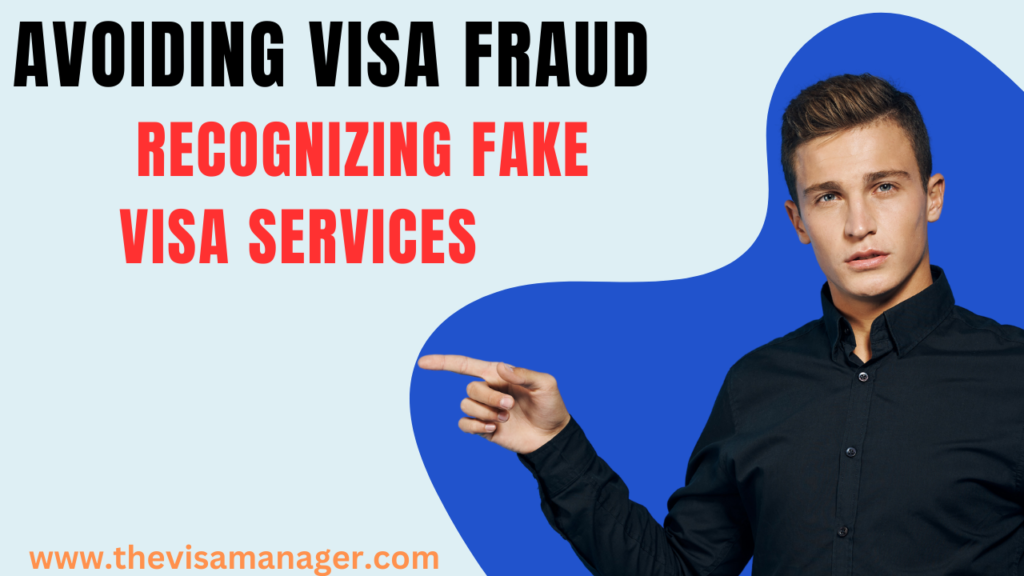
Traveling abroad, whether for work, study, or leisure, often requires a visa. Navigating the visa application process can be daunting, which is why many people turn to visa services for help. Unfortunately, the rise in demand has also led to an increase in visa fraud schemes. Scammers prey on unsuspecting travelers, promising quick and guaranteed visa approvals in exchange for hefty fees. To protect yourself, it’s crucial to recognize the warning signs of fake visa services.
In this blog, we’ll outline some essential tips for identifying fraudulent visa services and provide advice on how to protect yourself from falling victim to these scams.
Unbelievable Promises and Guarantees
One of the most common tactics of visa fraudsters is offering guaranteed visa approvals or expedited services that seem too good to be true. Be wary of services that make the following claims.
Guaranteed Visa Approval
No legitimate visa service can guarantee visa approval. Visa applications are subject to review by the relevant government authorities, and approval is based on the merits of each case.
Express Visa Processing
While some countries offer premium processing services, these are typically well-documented and handled by official government entities. If a service claims they can get you a visa in an unusually short time for a high fee, it’s a red flag.
No Physical Office or Official Website
Legitimate visa service providers will have an official office address, a professional website, and proper contact information. If the company operates entirely online without a physical location or offers only vague contact information (such as a P.O. Box), it’s likely a scam.
1] Verify the business address using Google Maps or a similar tool.
2] Look for an active customer service line or email with a professional domain (not generic email services like Gmail or Yahoo).
3] Confirm that their website is secure (the URL should start with “https”).
Upfront Fees and Unclear Pricing
Fraudulent visa services often demand full payment upfront or provide unclear pricing structures. A genuine service will clearly outline their fees, usually in stages depending on the complexity of the visa application process. Beware of.
Large upfront payments: Scammers often insist on full payment before providing any services.
Hidden fees: Some fake services may introduce “extra fees” during the process, continuously demanding money without delivering the service.
Legitimate visa services will provide a clear breakdown of costs, which should include service fees, government fees, and any optional extras like document translations or legal consultation.
Unsolicited Offers and High-Pressure Tactics
Visa scammers often use unsolicited emails, phone calls, or social media messages to lure potential victims. They might claim you’re eligible for a visa lottery, or that they have special connections within embassies. If the offer comes out of the blue or the service pressures you to act quickly, it’s a clear sign of a scam. Be cautious of.
Limited-time offers: Scammers use urgency to make you feel like you need to act immediately, without giving you time to research.
Unsolicited communication: Legitimate visa services do not cold-call or spam individuals with promises of visa approvals.
Lack of Accreditation or Official Endorsements
Legitimate visa services are often accredited by relevant governmental or international bodies. Check whether the visa service provider is accredited by recognized institutions, such as.
1] Government agencies (like your country’s foreign ministry or embassy).
2] Accredited travel associations.
3] Verified visa agents or lawyers with proven track records.
Additionally, check for customer reviews on trusted platforms and forums. Negative reviews or a lack of online presence can be a significant indicator of a fake service.
Suspicious or Poorly-Designed Documents
Fraudulent visa services may provide fake documents, such as visa application forms, approval notices, or appointment letters that look official at first glance but contain errors. Some red flags include.
1] Poor grammar or spelling mistakes in official-looking documents.
2] Logos that seem pixelated or incorrectly formatted
3] Application forms that do not match the official documents used by government agencies
Always compare the documents you receive with the ones available from the official embassy or consulate websites.
Fake Websites Mimicking Official Pages
Fraudsters often create websites that mimic official embassy or visa agency pages. These websites can look professional but are designed to steal personal and financial information. To avoid falling for these scams.
1] Always verify the website’s URL. Official government websites typically have domains like “.gov” or “.gov.[country]”.
2] Cross-check information from these websites with official government sources, such as the embassy’s official webpage.
How to Protect Yourself from Visa Fraud
Research the Service: Before committing to a visa service, research them thoroughly. Look for reviews from reliable sources, check for any complaints, and verify their credentials.
Verify Official Channels: When in doubt, always contact the embassy or consulate directly to inquire about visa procedures. They can recommend trusted visa agents if necessary.
Use a Credit Card for Payments: If possible, use a credit card when paying for visa services. Many credit card companies offer fraud protection, which can help you recover funds in case of a scam.
Trust Your Instincts: If something feels off, it probably is. High-pressure sales tactics, unclear documentation, and a lack of transparency are all reasons to walk away and seek legitimate help.
Final Thoughts
Visa fraud is a growing problem, but with the right knowledge, you can protect yourself from falling victim to scams. By recognizing the signs of fake visa services and staying informed, you can ensure a safe and legitimate visa application process. Always rely on trusted and verified sources when seeking visa assistance, and remember: if something seems too good to be true, it probably is Safe travels! .
